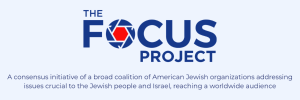
STAY INFORMED – TALKING POINTS – ACTIONS TO CONSIDER – STORIES MAKING NEWS
![]()

A deadly war now being waged over the skies of Iran and Israel is killing dozens and threatening not only Israel’s existence, but also the global economy and even world peace. This edition aims to cut through the headlines and provide clear answers to pressing questions about this rapidly unfolding crisis. We will delve into Israel’s significant and ongoing military action, Operation Rising Lion, airstrikes against Iranian nuclear, military and infrastructure targets, and Iran’s lethal retaliation of missiles and drones. Scenes of destruction throughout Israel and Iran and alarming casualty reports on both sides have captured the world’s attention.
The operation’s name may be drawn from biblical strength (“Behold, the people shall rise up as a great lion,” Numbers 23:24) and a powerful play on ancient Iranian symbolism of a lion and sun that were on the national flag until the Islamic Revolution. This highlights Israel’s resolute determination to act decisively in self-defense against existential threats to prevent a nuclear catastrophe and possibly allow Iranians to topple their government. Exiled Iranian Crown Prince Reza Pahlavi recently made repeated calls for Iranians to “overthrow and liberate Iran.”
Since June 13, the ‘shadow war’ – marked by years of Israeli and American sabotage operations – has erupted into open conflict. The Israeli Air Force has conducted extensive strikes deep within Iran, with reports of significant damage and casualties among top commanders and nuclear scientists. In response, Iran has launched deadly barrages intentionally targeting densely populated Israeli residential areas – totaling more than 400 ballistic missiles and hundreds of lethal drones.
Why did Israel act now?
Israel acted decisively in the face of Iranian nuclear threats to Israel becoming imminent. Iran has repeatedly called for Israel’s destruction for decades – and accelerated its nuclear program after the Iran-backed Hamas Oct. 7 massacre. After years of warnings and failed diplomacy, the UN’s nuclear watchdog (IAEA) recently voiced “serious concern” and confirmed Israel’s assessment that Iran was rapidly advancing its nuclear program – enriching uranium to dangerous levels that could only be used in nukes.
President Trump gave Iran 60 days to make a deal by June 12, a deadline that passed. Israel launched its airstrikes on day 61. Iran also was rebuilding its air defense system, radars and other military capabilities after Israel crippled them in targeted strikes last year. This was not Israel’s first preemptive strike against an existential nuclear threat: the Israeli Air Force destroyed Iraq’s nuclear reactor in 1981 and Syria’s in 2007. Neither country restarted their program.
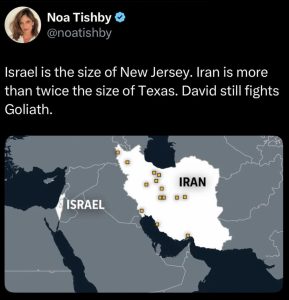
How can Iran be the aggressor when Israel attacked first and is killing more people?
Israel’s pre-emptive strike aimed to prevent a catastrophe of unimaginable scale. Imagine if just one of the Iranian missiles hitting Israel was armed with a nuclear warhead? Iran has historically and repeatedly declared its intent to destroy the Jewish state, the size of New Jersey.
There also is a major difference in military tactics. Iran intentionally fires missiles at Israeli homes, while the Israeli Defense Forces focus on Iranian military and political sites. Iranian missiles have destroyed houses, apartment buildings and a science lab dedicated to finding a cure for cancer. Israel used precision weapons to target Iran’s nuclear weapons program and scientists. Israel warns Iranian civilians living near certain facilities to leave before military strikes. Iran does not separate civilian from military deaths in its reports.
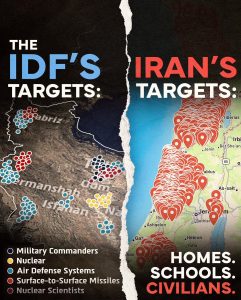
Why does Israel believe it cannot negotiate with the current Iranian regime?
How can Israelis “meet in the middle” with a government whose stated goal is total annihilation of the Jewish state? Negotiations are impossible. Any expectation of successful negotiation eroded over decades of Iran’s genocidal rhetoric and proxy wars, coupled with its decades-long nuclear program. There is no diplomatic answer to an existential threat that also promotes the hatred of Jews (antisemitism) around the world.
Is Iran a threat to the U.S.?
Iran has directly attacked Americans for nearly 50 years. This includes seizing 52 American citizens for 444 days at the U.S. Embassy at the start of the Islamic Revolution of 1979 and its attempted cyberattack against Boston’s Children Hospital in 2021 – trying to “interrupt ongoing patient care and emergency surgeries.” Iran also had a direct role in the 1983 Marine barracks bombing in Beirut that killed 241 U.S. servicemembers. Iran continues to openly call for America’s destruction. The terror regime armed and directed militias responsible for maiming and killing hundreds of U.S. soldiers in Iraq and Afghanistan, and Iranian agents continue to plot attacks on American soil.
Is Israel dragging the U.S. into a wider conflict?
This dangerous narrative is echoed by prominent anti-Israel voices from the far-left and far-right. They claim that Israel wants America to fight on its behalf – a classic stereotype of Jews. Despite their very different ideologies, figures like Tucker Carlson, Candace Owens, Rep. Marjorie Taylor Greene and Rep. Rashida Tlaib, unite in their antagonism against the Jewish state and, often, American Jews.
Sen. Lindsey Graham compared them to “the heirs of Neville Chamberlain” – the British prime minister in the 1930s who believed that Hitler could be appeased through negotiations. Israel is acting in full coordination with America, but without the U.S. participating in any military attacks. A strong U.S.-Israel alliance is important against shared threats like Iran and the U.S. military is providing defensive support to Israel.
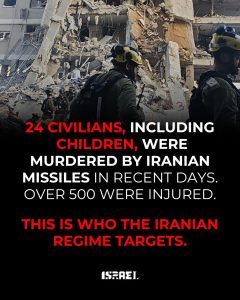
Is a wider regional war inevitable?
The risk of escalation in the past would have been high, but Israel has severely damaged the ability of Iran’s proxies to simultaneously attack Israel – including Hamas, Hezbollah and the Houthis in Yemen. The strength of the Abraham Accords and the unspoken support of Iran’s enemies – the UAE, Bahrain and Saudi Arabia – also make a larger conflict less likely. Israel’s targeted strikes aim to destroy Iran’s nuclear program and stop its aggression.
Are Western countries condemning Israel’s actions?
Israel is fighting for the Western values of democracy and freedom. Many countries, including some in Europe, have supported Israel’s right to self-defense. German Chancellor Merz: “This is the dirty work Israel is doing for all of us. We are also victims of this regime. This mullah regime has brought death and destruction to the world.”
Crucially, the U.S. is pursuing intense diplomatic efforts. It supports Israel’s right to defend itself, while urgently working to de-escalate the broader conflict and pressure Iran to abandon its nuclear weapons program. Israel fights what it sees as a war for the entire free world – essentially doing the work of many nations – and makes painful choices now to prevent a much larger and more devastating war.
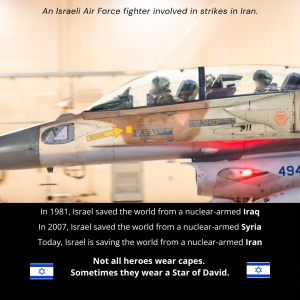
How is Israeli society unifying and enduring through multiple conflicts?
Israelis have been resilient in their multifront war: facing rockets from Hamas and Yemen, and drones and missiles from Iran. While local political debates continue, the direct Iranian threat has unified Israelis: a majority think the campaign will unite society and only 16% oppose Israel’s operation. Faced with an enemy openly committed to their destruction, they all share the desire to live in peace. Israeli opposition leader Lapid: “When it comes to the security of the people of Israel in the face of our enemies, we are one people, with one mission. Our children will not live in fear of an Iranian nuclear bomb. Not today, not ever.”
In times of crisis, Israelis of all backgrounds show a deep commitment to everyone in Israeli society. Muslim Arab volunteer medic Jamal Waraki was a first responder on Oct. 7 and recently rescued an 80-year-old Israeli buried under rubble. He described the Iranian regime: “These are not humans. They are monsters who deliberately target civilians.”
Nine Israelis stranded in Cyprus traveled on a tugboat to enter Israel during the war, including former Jerusalem Post editor Ya’akov Katz: “We are a people who run toward home, not away from it. Toward our families, our communities, our nation. Even in war.”
Does the Iranian regime truly represent the will of its people?
Many Iranians – especially those living outside the country – do not share its government’s hatred of Jews and Israelis. They want a future of freedom and peace, like they had before the 1979 Islamic Revolution. Iranians who break strict moral codes – including women who refuse to wear the hijab and individuals identifying as gay – are often imprisoned, beaten and even killed.
Videos and voice messages from Iranians include chanting, “Death to the Dictator, death to the Islamic Republic,” “I wanted to thank Israel and Uncle Netanyahu for what they did” and “We need to be united to topple this blood thirsty government.” Reza Pahlavi, the exiled Crown Prince of Iran, is encouraging Iranians to overthrow the regime and “reclaim their nation.”
![]()

![]()

Standing united against Iran’s threats and for human rights requires informed action:
![]()

The Jewish Spirit of Resilience: A First-Hand Account of the Israel-Iran War, as told to The Focus Project by an American-Israeli woman in Beit Shemesh, Israel

At 3:00 a.m. on Friday, a red alert shattered the quiet, sending us scrambling into our mamad (protected room). We assumed it was another routine rocket from Yemen – an unsettling but familiar disruption. But within minutes, reports confirmed this was different: Israel had carried out a surprise strike on Iran’s nuclear facilities in Tehran. We were told to stock our shelters with food, water and necessary supplies. A massive Iranian counterattack seemed imminent.
For weeks, speculation about whether Israel would strike had circulated. Many feared that if it did, Iran’s response would be devastating. Messages from family poured in, unsure if they were sending love or saying goodbye. Yet, miraculously, the long-dreaded, immediate response didn’t come. Within 30 minutes, we were cleared to leave the mamad. Authorities later confirmed the early sirens were precautionary. Israel’s operation had caught Iran off guard, severely damaging its capabilities. By midday Friday, even secular broadcasters were calling the mission a miracle — some reading psalms live on air. Government officials shared the euphoria but warned a deadly attack from Iran was still likely.
That attack came just as we lit Shabbat candles Friday night. Sirens blared again, and we returned to the mamad with instructions to remain until further notice. An hour later, we were cleared to leave by Home Front Command but told that we needed to stay near the shelter – a reality that has become common place since then. Our reprieve was brief, as it granted us just enough time to eat quickly and settle our kids to sleep in the shelter. As we cleaned up, the sirens blared again. The night passed in a blur of interrupted sleep, trips in and out of the mamad, frightened children, and the distant booms of Iron Dome interceptions. While not the hundreds we feared, the barrages still came in waves of dozens.
Since then, our children sleep in the mamad nightly, too afraid to return to their rooms. They ask if more sirens are coming. We tell them the truth – we don’t know – but reassure them that we’ll always keep them safe, with God’s help. Our lives now revolve around alerts. A new early-warning system gives us a few minutes’ notice. We have learned to shower quickly, eat fast, and structure playtime with bathroom trips around the anticipated missile barrages.
This alert-driven reality mirrors the intensity of life post-Oct. 7. Flights are grounded, transportation halted, schools and non-essential businesses closed. No one leaves home without knowing the location of the nearest shelter. For those without an in-home mamad, the fear is worse. One mother shared on a local Whatsapp chat about how she has barely slept and how her family has had to run to various shelters nearby: a synagogue’s mamad, a dark public shelter, or miklat, and a supermarket shelter – her son shaking with fear as the ground trembles from the boom of rockets overhead.
Unfortunately, the shelters have not been enough to prevent every loss. I cry as I read that more than two dozen Israelis have been murdered and more than 600 have been injured in the missile barrages from Iran. Cities like Bat Yam, Tel Aviv, and Haifa have all reported casualties, while the rest of the Jewish world mourns.
The fear doesn’t end when the sirens stop. Every decision – laundry, cooking, even friendly conversations – is affected by the question: “Will this be interrupted by a siren?” We scan headlines after every barrage, praying to read “No injuries,” and shedding tears when we don’t. Many mothers care for young children alone, with fathers called up for reserve duty.
With schools closed, I try to create normalcy at home – filling days with stories, prayers, crafts, dancing. My husband balances religious responsibilities, work calls and parenting, while our teenage son and his peers are more annoyed by being stuck at home while still taking school tests rather than being frightened. Community life continues through it all: men still attend synagogue, and neighbors still check in on one another.
Now at day five, a remarkable shift has occurred. Thursday night was spent huddled in prayer for safety. Friday night was a volley of in-and-out trips to the mamad. By Sunday, we heard just one siren and Monday brought none to our area, while other regions still unfortunately endured attacks. Iran’s capabilities are noticeably weakening – dropping from over 100 missiles Friday to fewer than 10 on Monday night.
Amid the fear, something else has emerged: awe. There’s a growing sense that we’re witnessing biblical level history. During a missile barrage siren in the north, Israelis had to stop their cars while driving through a tunnel. Rather than sitting in fear, they began dancing and singing about how God does good to His people – an act not of denial, but of faith. Even my proudly secular Israeli cousins have been quoting Torah scripture and sharing how the weekly Torah reading connects with the week’s events. National Unity Party leader, Benny Gantz, was photographed praying with tefillin at a bomb site in Haifa. Gantz is not religious. In adversity, the differences between us have lost significance. Our focus has been on our love for one another and our divine connection to our ancient homeland. This is the Jewish spirit and resilience that has defined us for thousands of years.
Iran’s hatred is ancient. The war against us for being Jews is nothing new. But with God’s help, we face it with strength, unity, and unwavering faith—confident that “the Guardian of Israel neither slumbers nor sleeps” and He can handle Iran.
![]()

Stories Impacting American Jews
Stories Impacting the U.S. and Israel
Stories From Around the World
Stay Informed | Speak Up | Take Action
Want to Read More of Our Talking Points? Did you miss a recent edition of The Focus Project? No need to search your inbox. Our most recently published editions are available on our website.
![]()

This content is developed by The Focus Project in partnership with MERCAZ USA. The Focus Project distributes weekly news and talking points on timely issues concerning Israel and the Jewish people, including antisemitism, anti-Zionism and the delegitimization of Israel. It represents a consensus view across a spectrum of major American Jewish organizations. MERCAZ USA recognizes and respects the diversity of views on these issues among its readers and the community at large.
![]()